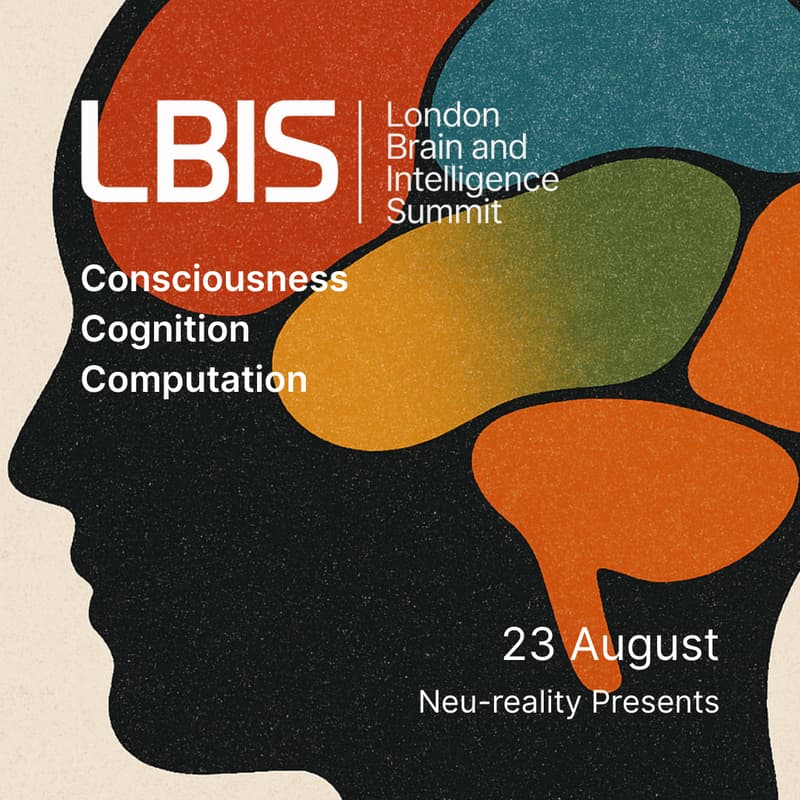

London Brain and Intelligence Summit - Main Conference
Step into a space where leading thinkers explore the frontiers of consciousness, cognition, and computation. From the science of altered states and the therapeutic potential of psychedelics, to computational models and brain-inspired AI, the summit invites bold ideas and rigorous debate on how we understand the mind—and how we might shape it.
Through keynote talks, in-depth discussions, and a focused roundtable, participants will examine emerging discoveries, challenge assumptions, and imagine new possibilities for human and machine intelligence. This is a place for those curious about the mind’s deepest mechanisms and the transformative technologies that could redefine them.
For more information, visit lbis.noetex.ai
Speakers
Tristan Bekinschtein
Professor of Consciousness and Cognition, University of Cambridge
Dr Bekinschtein is a biologist, Master in Neurophysiology and PhD in Neuroscience, Buenos Aires University. He has been an EU Marie Curie Fellow and senior researcher at the MRC-Cognition and Brain Sciences Unit, Cambridge, and a Fyssen fellow at ICM, Paris. He has also been an Invited Researcher at QBI, Australia and INECO, Argentina. In 2011 he founded the Consciousness and Cognition Lab, now at the Department of Psychology, University of Cambridge. He is Wellcome Trust Fellow and now Turing Fellow. His lab is primarily interested in the complexity of thought and what makes us human. He works on the cognitive neuroscience of consciousness, primarily on the fragmentation of cognition as we lose consciousness while falling asleep or getting sedated; on the cognitive and neural differences between conscious states; and on the interaction between attention and consciousness in health and disease.
Andrea Luppi
Wellcome Early Career Fellow at the University of Oxford, Fellow of St John’s College Cambridge
A philosopher turned neuroscientist, Dr Luppi trained in philosophy and cognitive science at the University of Oxford and Harvard University, before obtaining a PhD in neuroscience as a Gates Scholar from the University of Cambridge, and completed postdoctoral training as a Molson Neuro-engineering Fellow and Banting Fellow at the Montreal Neurological Institute. His work investigates how brain function and consciousness arise from the complex interplay of brain structure and dynamics across scales. To this end, he combines approaches from information theory, network science and whole-brain computational modelling to investigate pharmacological and pathological perturbations of brain function and consciousness across species and across modalities – such as disorders of consciousness, anaesthesia and psychedelics. His long-term goal is to understand what makes brains conscious and intelligent, how we can achieve more human-like artificial systems, and how we can promote the recovery of healthy brain function and cognition in brain-injured patients.
Devin B. Terhune
Reader in Experimental Psychology in the Department of Psychology in the Institute of Psychiatry, Psychology, & Neuroscience at King’s College London
Dr Terhune completed his PhD on the cognitive neuroscience of dissociation and suggestibility at Lund University and was previously a Postdoctoral Research Fellow in the Department of Experimental Psychology at the University of Oxford and a Lecturer in the Department of Psychology at Goldsmiths, University of London. His research draws on methods and theories from cognitive neuroscience, experimental psychology, and cognitive neuropsychiatry with an aim to characterize different features of awareness, with a focus on dissociative states and hallucinations, and how they can be modulated using verbal suggestion and pharmacological agents.
Host
Neu-reality
This event is hosted by Neu-reality, a nonprofit platform dedicated to advancing science communication and innovation of neuroscience and AI. Operating between Shanghai and London, Neu-reality is one of China’s leading science media outlets, with over one million subscribers and a global contributor network of over 400 writers and experts. Our work has been recognized by Scientific American, Cell Press, Frontiers, ByteDance, and the Berggruen Institute, among others. We aim to foster meaningful, cross-disciplinary exchange across global communities and bridge Eastern and Western perspectives in science and innovation.
Partner
EAST2046
EAST2046 is a forward‐looking cultural festival blending digital art, community building and cutting‐edge academic inquiry. Rooted in the real experiences of East and Southeast Asian diasporas worldwide, it experiments and collaborates to reframe the relationship between Eastern cultures and the future—building new modes of cultural expression at the intersection of technological innovation and artistic perception. Inspired by Deleuze & Guattari’s “rhizome,” EAST2046 unfolds as a multi-node cultural network, with each event acting as a creative node across diverse spaces.